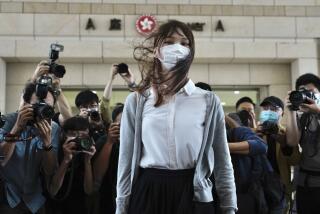Freed Chinese Dissident Feels Thrilled, Daunted
NEW YORK — A Chinese democracy activist who was released from jail and flown to the United States is overjoyed by his new freedom but awed by the task of starting his life over at 59, his daughter said Wednesday.
Xu Wenli, freed after four years in a Chinese prison, spent the day catching up with his family and sleeping off jet lag after arriving in New York, said his daughter, Xu Jin.
“It’s overwhelmingly joyful,” the daughter said. “There are just a lot of emotions, and it’s going to be hard. To start your life all over -- that’s tough, but we’ll get through.”
Xu Wenli was jailed after trying to set up the opposition China Democracy Party with other activists. The Communist government quickly crushed the party and sent dozens of members to prison, sentencing Xu to 13 years.
He was freed Tuesday after intense lobbying by Clark Randt, the American ambassador to Beijing, and repeated requests for his freedom by U.S. legislators visiting China.
The release came a week after U.S. Assistant Secretary of State Lorne Craner said he had appealed to Chinese officials during human rights talks in Beijing to free Xu.
Xu and his wife, He Xintong, flew from Beijing to Chicago, where they met 30-year-old daughter Xu Jin. The family then flew to New York City.
“It’s nice to be a free man, to be with my wife and daughter,” Xu Wenli said after touching down at New York’s La Guardia International Airport. “Because of them I am free.”
Xu is the first person convicted of endangering state security -- a charge that has been used against leading Chinese dissidents -- to be released early from prison, according to American human rights activists.
He was also arrested in 1979 for advocating greater political freedoms during the Democracy Wall movement. He was imprisoned from 1982 to 1993 on charges of counterrevolution.
The family is staying with friends in Manhattan for a few days before traveling to Pawtucket, R.I., where Xu Jin lives and teaches at a private high school.
Xu Jin said in a telephone interview that her father had not yet determined what he would do in the United States. “I think we’ll just go around to see friends, and enjoy vacation, and then go on to a new life,” she said. “We’ll take it one day at a time.”
Xu, who suffers from hepatitis B, was granted medical parole by the Chinese government.
China has rid itself of other prominent political prisoners by paroling them on health grounds -- usually on condition that they go into exile, most often in the United States, where they lose their political influence in China.
More to Read
Sign up for Essential California
The most important California stories and recommendations in your inbox every morning.
You may occasionally receive promotional content from the Los Angeles Times.










